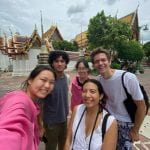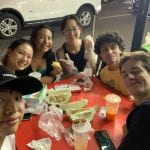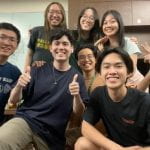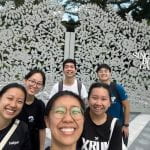If there is one thing I would recommend to all Cornell engineers, it would be to study abroad. Spending a semester in a completely foreign environment is daunting, no matter how adventurous you are. But even for those of us who prefer to stay in the comfort of a place we know well, I think that a step outside of this comfort zone is one that you will never regret taking.
 I spent the first semester of my senior year studying at the National University of Singapore (NUS). When I first arrived, after a 17-hour plane ride, I was greeted by the infamous hot and humid weather. I started classes the very next day, and I got lost many times trying to navigate the bus system on campus. However, when I finally found the classroom for my Machine Learning in Robotics class, another exchange student approached me. He probably noticed the confused look on my face, so he came over and introduced himself as Vaibhav, a fellow exchanger. In the following weeks, I got used to the warm climate, convenient transportation, and super affordable and delicious food at NUS. I even went on trips to Malaysia, Thailand, and Vietnam with Vaibhav (pictured below with the curly hair) and many others.
I spent the first semester of my senior year studying at the National University of Singapore (NUS). When I first arrived, after a 17-hour plane ride, I was greeted by the infamous hot and humid weather. I started classes the very next day, and I got lost many times trying to navigate the bus system on campus. However, when I finally found the classroom for my Machine Learning in Robotics class, another exchange student approached me. He probably noticed the confused look on my face, so he came over and introduced himself as Vaibhav, a fellow exchanger. In the following weeks, I got used to the warm climate, convenient transportation, and super affordable and delicious food at NUS. I even went on trips to Malaysia, Thailand, and Vietnam with Vaibhav (pictured below with the curly hair) and many others.
 In addition to interacting with exchange students from diverse backgrounds, I also had the opportunity to meet many local students from Singapore and Southeast Asia. Thanks to NUS’s exchange buddy program, I was paired with Simone, a local student who had previously studied abroad in the US herself. Despite her busy schedule as a senior and volunteer, Simone and I embarked on various adventures to explore Singapore’s rich cultural and natural heritage. From hiking trails to vibrant districts like Little India, and from the serene Botanic Gardens to the very neighborhood she grew up in, our outings were filled with unforgettable experiences.
In addition to interacting with exchange students from diverse backgrounds, I also had the opportunity to meet many local students from Singapore and Southeast Asia. Thanks to NUS’s exchange buddy program, I was paired with Simone, a local student who had previously studied abroad in the US herself. Despite her busy schedule as a senior and volunteer, Simone and I embarked on various adventures to explore Singapore’s rich cultural and natural heritage. From hiking trails to vibrant districts like Little India, and from the serene Botanic Gardens to the very neighborhood she grew up in, our outings were filled with unforgettable experiences.
Additionally, I was lucky to meet very welcoming and friendly people on my floor of Tembusu College, my residence hall. Whether we were just studying, eating, or chatting in the common lounge, the inclusive atmosphere made me feel like I was part of a big family. Even now, a semester later, I’m still in touch with everyone.
 Lastly, I wanted to share some tips about how to start the process of researching, applying, and preparing for studying abroad. One hurdle that stopped me from studying abroad earlier was the worry that I wouldn’t be able to finish my major requirements on time. However, NUS offers courses which can be used towards my major requirements in ECE as well as my minor in Robotics, so I was able to remain on track for my expected graduation date. Choosing the right study abroad destination and navigating logistical details such as housing, coursework, and paperwork can be daunting. I recommend beginning by exploring the Education Abroad page on the Office of Global Learning’s website to review the range of programs available. When narrowing down your options, consider key factors such as whether the program offers a sufficient number of courses relevant to your major requirements (aim for at least 3-5, as course availability can vary), and whether student housing is provided.
Lastly, I wanted to share some tips about how to start the process of researching, applying, and preparing for studying abroad. One hurdle that stopped me from studying abroad earlier was the worry that I wouldn’t be able to finish my major requirements on time. However, NUS offers courses which can be used towards my major requirements in ECE as well as my minor in Robotics, so I was able to remain on track for my expected graduation date. Choosing the right study abroad destination and navigating logistical details such as housing, coursework, and paperwork can be daunting. I recommend beginning by exploring the Education Abroad page on the Office of Global Learning’s website to review the range of programs available. When narrowing down your options, consider key factors such as whether the program offers a sufficient number of courses relevant to your major requirements (aim for at least 3-5, as course availability can vary), and whether student housing is provided.
 I was fortunate to secure on-campus housing, but if that’s not an option, be sure to research the cost of rent and the commute length from alternative accommodations. Additionally, hearing from students who have participated in the exchange programs can provide valuable insights. I found it beneficial to read student testimonials on school websites and even watch YouTube videos created by previous students to gain a better understanding of the process. Lastly, make sure to research the timeline for applying to programs and don’t wait until the last minute like I did!
I was fortunate to secure on-campus housing, but if that’s not an option, be sure to research the cost of rent and the commute length from alternative accommodations. Additionally, hearing from students who have participated in the exchange programs can provide valuable insights. I found it beneficial to read student testimonials on school websites and even watch YouTube videos created by previous students to gain a better understanding of the process. Lastly, make sure to research the timeline for applying to programs and don’t wait until the last minute like I did!
Overall, studying abroad is a priceless way to learn about new cultures, meet new friends, and gain a wider perspective of life around the world. Cornell’s campus is indeed gorgeous and filled with countless amazing people, but if you ever need an escape from the cold harsh winters or the daily climb up the hill, consider adding study abroad to the list of things absolutely need to do before you graduate!
~Tiffany, electrical and computer engineering major



